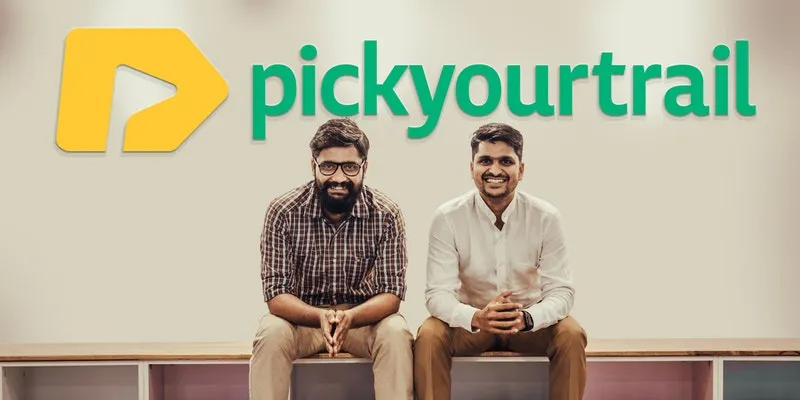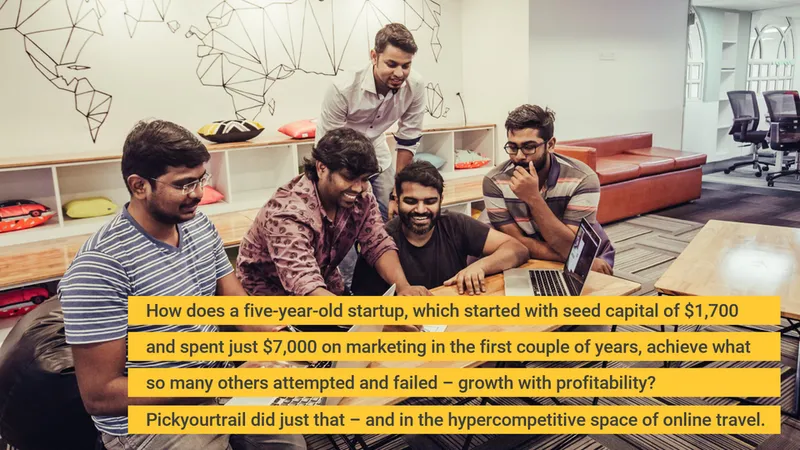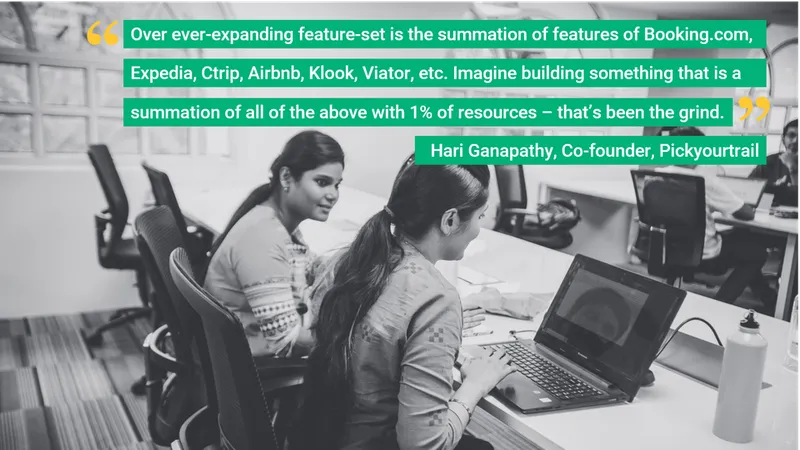How this Indian travel startup balanced rapid growth with profitability
From 1,500 travellers in 2016 to 10,000 in 2018, Chennai-based travel startup Pickyourtrail says it is on track to hit one million itineraries on the platform by the end of 2019.
How does a five-year-old startup, which started with a seed capital of $1,700 and spent just $7,000 on marketing for the first few years, achieve what so many have attempted and failed – growth with profitability? Especially in the hyper-competitive space of online travel.

Pickyourtrail founders (L) Srinath Shankar and (R) Hari Ganapathy
“A vacation unlike a train or a flight booking is not a transactional purchase. It’s an involved, multi-party, emotional decision. This translates to reassurance, empathy, and trust being the key drivers. This is where our unique touch + tech model helps,” Hari Ganapathy, Co-founder of Pickyourtrail, tells YourStory.
When we last featured personalised vacations provider Pickyourtrail in 2016, it had crafted trails for more than 1,500 travellers from 14 countries. Today, that number has grown to over 10,000 travellers. The number of people using Pickyourtrail has zoomed 115 percent in just the past five months; revenue has doubled over the same period (revenue in 2018 stood at a run rate of around $9.5 million). In just the first half of the year, over 300,000 itineraries have been created. The founders say they are on track to hit one million itineraries on the platform by the end of 2019.
Pickyourtrail is also that rare startup whose founders dived into a tech-led venture without any tech background. They even went without a head of engineering for half that time. And yet, the startup has built an enviable technology stack that has helped it scale while remaining profitable. It raised its Series A round only earlier this year from a group of entrepreneurs and HNIs.
Why Pickyourtrail?
Founders Hari Ganapathy and Srinath Shankar started Pickyourtrail on the premise that search, discovery, and payment for travel and international vacations were “broken”. As Hari wrote in a blog post a few months ago, they had no technology background, no work experience in the travel industry, and were going to be first-generation entrepreneurs. But they’d known each other for a decade and loved to travel.
Today, Hari enthusiastically describes the differences between different customer segments. The first-time traveller looking to go abroad doesn’t distinguish Pickyourtrail from big brands like MakeMyTrip, Thomas Cook or their neighbourhood travel agency – and they have plenty of those. It’s the experienced traveller, which Hari describes as the “CRED” audience – the internet-savvy upper middle class - who use their self-serve platform to create personalised vacations where breakfast and sightseeing timings are not dictated as per a fixed itinerary.
“The capability to create, customise, and book international trips completely online and in under 10 minutes is what differentiates us from the rest of the pack,” Hari says.
Pickyourtrail helps users create, customise, and purchase vacations in one shot. “From an engineering and business standpoint, this translates to personalisation algorithms, price-matching meta search engines, recommendation models, and booking/cancellation APIs,” he explains. The company covers over 130 countries via partnerships with multiple API partners so that self-serve customers can truly have a product where what they see is what they actually get.
Growth through partnerships
The API partnerships have worked because they bring in real money for Pickyourtrail’s partners, who “have seen consistent year-on-year growth in revenue.”
Hari believes that in travel, the value of strategic partnerships is highly underrated. As he wrote in his blog post, “Our ever-expanding feature-set is the summation of features of Booking.com, Expedia, Ctrip, MMT, Airbnb, Klook, Viator, etc. Imagine building something that is a summation of all of the above with one percent of the resources — that’s been the grind.”
Driving this has been Pickyourtrail’s personalisation algorithm, which takes into account around 40 different factors for someone to plan their holidays. This gives the team deep insights into both supply and consumer behaviour.
Pickyourtrail also tracks the user itinerary journey – what the algorithm produced versus what the customer eventually booked.
“This helps us model the unstated needs and increase personalisation. Given that planning a vacation itself is part of the joy of the vacation, we are conscious of not overdoing things. This is by far the most debated topic in all product discussions…(and) we have taken the stand that there is a certain amount of joy in discovering things through learnability.”
Who says you need a techie among the founders?
Hari admits that the sheer idea of building a tech product with no tech co-founder was “outrageous”. In hindsight, however, he believes it worked in their favour as it gave them the time and space to experiment with things and understand what the customer did and did not want.
“When we put our tech team in place, they had a clear product roadmap built on the basis of customer feedback and not just our ideas. This has also hugely influenced how we continue to operate even today,” Hari points out.
“The biggest positive outcome was Sri and I had to understand tech,” he says while talking about how they rolled up their sleeves and got down to understanding the nuances of building their product stack – Sri naturally gravitated to the backend while Hari spent time on the design and front-end.

Technology was first an efficiency lever – for instance, it brought down the time required to customise an itinerary. Soon, they realised that in their business, solving the organisation’s problems using tech automatically resulted in customer delight.
“Over the past two years, we have seen tech transform from an efficiency lever to an innovation lever. Our routing algorithm is the best example. We are able to, in real-time, recommend what is best for the customer keeping in mind the cost,” he adds.
Incidentally, Pickyourtrail made a counter-intuitive move when they moved from Bengaluru (where the company was founded) to Chennai. Hari says it proved to be a pivotal decision for them – the founders had better networks in and around Chennai, and they were able to find the right talent and mentors.
That same network is what they tapped into when they decided to raise Series A funding round during their fifth year of operations. Instead of opting for traditional VC firms, the travel startup raised money from a clutch of entrepreneur-turned-investors and high net worth individuals.
“We had hit a sweet spot where the product was repeatable and scalable. What needs to be fixed is the repeatability and scalability of the experience on the ground. And for that, we need to get more folks to experience Pickyourtrail. This directly translates to marketing spends and building our own digital acquisition channel,” outlines Hari.
Pickyourtrail also plans to shore up its technology team and overall technology capabilities to ensure its product innovation efforts continue to be the best in the industry. It also plans to take the product global.
“Our goal is to be the best in the business when it comes to international trips!”
Tailwinds for the travel industry
It is a goal well supported by growth projections for the industry in India and worldwide. According to a recent report from the World Travel and Tourism Council (WTTC), the global travel and tourism industry has grown to $8.27 trillion in 2017. The report outlined how, across the world, “rise in middle-class population, rise in travels by millennial population compared to other generations, increased awareness among youth about travel destinations with growth in social networks, and decrease in the cost of air travel are increasing the number of people travelling across the globe”. And in 2016 alone, more than three-quarters of travel revenue generated came from leisure travel.
Last year, VFS Global, which processes visas for 62 countries, said it had processed 5.28 million visa applications out of India, a 14 percent year-on-year increase. Applications from non-metro cities and towns also jumped significantly, it added.
“Older people are surely travelling a lot more often. The fact that we let them customise the trip means that they are able to take it at their own pace and leisure,” says Hari, adding that younger folks are more “experimental”.
“Weekend getaways to places like Qatar, Maldives, Thailand, Dubai, and Sri Lanka are now becoming mainstream. In fact, some customers from Mumbai do short trips to Europe around specific events,” says Hari.
These include everything from sports world cups to the Tomatina Festival in Spain, not to mention natural phenomena like the Northern Lights and the Tulip festival.
“The challenge when it comes to events is that ticketing is sometimes exclusive or heavily regulated and hence it's not always possible to bring them online. In those cases, we take these requests offline and not on the DIY platform,” adds Hari.

They have also seen how Indians are getting adventurous and trying to discover places at shoestring budgets.
“The biggest challenge is the visa. Our passport needs to become a lot more globally accepted and more countries need to allow us to have visa on arrival programmes for backpacking to take off at the same scale as the US. And who better than a Prime Minister who travels a lot, to help us solve this problem,” he laughs.
Pickyourtrail may be over five years old now, but Hari feels they’re just getting started. “There are a lot of opportunities for us to tap into newer businesses. We continue to back ourselves to test new ideas and pick up ones that customers value.”
What’s next on the itinerary?
And while they have raised funding and want to focus on achieving bigger scale globally, the focus on profitability remains. What’s more, their NPS score has remained steady at 70-72 despite all the rapid growth over the past couple of years.
As Hari puts it, “Such a highscore in such a fragmented and service-led market speaks volumes about how well our tech is aligned to customer needs. We will continue to put customers at the forefront and build solutions that exponentially delight them. A vacation is supposed to be a happy memory and we want to ensure that it stays that way.”









